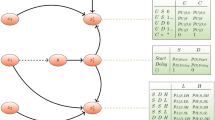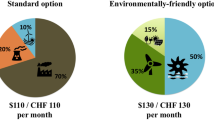Abstract
Many people are worried about the harmful effects of climate change but nevertheless enjoy some activities that contribute to the emission of greenhouse gas (driving, flying, eating meat, etc.), the main cause of climate change. How should such people make choices between engaging in and refraining from enjoyable greenhouse-gas-emitting activities? In this chapter, we look at the answer provided by decision theory. Some scholars think that the right answer is given by interactive decision theory, or game theory; and moreover think that since private climate decisions are instances of the prisoner’s dilemma, one rationally should engage in these activities provided that one enjoys them. Others think that the right answer is given by expected utility theory, the best-known version of individual decision theory under risk and uncertainty. In this chapter, we review these different answers, with a special focus on the latter answer and the debate it has generated.
Similar content being viewed by others
References
Ahmed, A. (2014). Evidence, decision and causality. Cambridge University Press.
Bales, A., Cohen, D., & Handfield, T. (2014). Decision theory for agents with incomplete preferences. Australasian Journal of Philosophy, 92(3), 453–470.
Bartha, P., & DesRoches, C. T. (2017). The relatively infinite value of the environment. Australasian Journal of Philosophy, 95(2), 328–353.
Bolker, E. D. (1967). A simultaneous axiomatization of utility and subjective probability. Philosophy of Science, 34(4), 333–340.
Bradley, R. (2017). Decision theory with a human face. Cambridge University Press.
Bradley, R., & Steele, K. (2015). Making climate decisions. Philosophy Compass, 10(11), 799–810.
Briggs, R. (2010). Decision-theoretic paradoxes as voting paradoxes. Philosophical Review, 119(1), 1–30.
Broome, J. (2012). Climate matters: Ethics in a warming world. W. W. Norton & Company.
Broome, J. (2013). A small chance of disaster. European Review, 21(S1), S27–S31.
Broome, J. (2019). Against denialism. The Monist, 102(1), 110–129.
Buchak, L. (2013). Risk and rationality. Oxford University Press.
Budolfson, M. (2019). The inefficacy objection to consequentialism and the problem with the expected consequences response. Philosophical Studies, 176(7), 1711–1724.
Chang, R. (2002). The possibility of parity. Ethics, 112(4), 659–688.
Cripps, E. (2013). Climate change and the moral agent: Individual duties in an interdependent world. Oxford University Press.
Cullity, G. (2015). Acts, omissions, emissions. In J. Moss (Ed.), Climate change and justice (pp. 148–164). Cambridge University Press.
Cullity, G. (2019). Climate harms. The Monist, 102(1), 22–41.
Gardiner, S. (2001). The real tragedy of the commons. Philosophy and Public Affairs, 30(4), 387–416.
Gardiner, S. (2011). A perfect moral storm: The ethical tragedy of climate change. Oxford University Press.
Hardin, G. (1968). The tragedy of the commons. Science, 162(3859), 1243–1248.
Hare, C. (2010). Take the sugar. Analysis, 70(2), 237–247.
Hedden, B. (2020). Consequentialism and collective action. Ethics, 130(4), 530–554.
Herzberg, F. (2011). Hyperreal expected utilities and Pascal’s Wager. Logique et Analyse, 54(213), 69–108.
Hiller, A. (2011). Climate change and individual responsibility. The Monist, 94(3), 349–368.
Jeffrey, R. C. (1965). The logic of decision. University of Chicago Press.
Johnson, B. L. (2003). Ethical obligations in a tragedy of the commons. Environmental Values, 12(3), 271–287.
Joyce, J. M. (1999). The foundations of causal decision theory. Cambridge University Press.
Kagan, S. (2011). Do I make a difference? Philosophy and Public Affairs, 39(2), 105–141.
Kingston, E., & Sinnott-Armstrong, W. (2018). Kingston. What’s wrong with Joyguzzling? Ethical Theory and Moral Practice, 21(1), 169–186.
Lawford-Smith, H. (2016). Difference-making and individuals’ climate-related obligations. In C. Hayward & D. Roser (Eds.), Climate justice in a non-ideal world (pp. 64–82). Oxford University Press.
Lorenz, E. (1963). Deterministic nonperiodic flow. Journal of the Atmospheric Sciences, 20, 130–141.
Lorenz, E. (1969). The predictability of a flow which possesses many scales of motion. Tellus, 3, 290–307.
Morgan-Knapp, C., & Goodman, C. (2015). Consequentialism, climate harm and individual obligations. Ethical Theory and Moral Practice, 18(1), 177–190.
Nash, J. (1950). Equilibrium points in n-person games. Proceedings of the National Academy of Sciences, 36(1), 48–49.
Nefsky, J. (2011). Consequentialism and the problem of collective harm: A reply to Kagan. Philosophy and Public Affairs, 39(4), 364–395.
Nefsky, J. (2021). Climate change and individual obligations: A dilemma for the expected utility approach, and the need for an imperfect view. In M. Budolfson, D. Plunkett, & T. McPherson (Eds.), Philosophy and climate change (pp. 201–2021). Oxford University Press.
Parfit, D. (1984). Reasons and persons. Oxford University Press.
Pindyck, R. S. (2020). What we know and don’t know about climate change, and implications for policy. National Bureau of Economic Research, Working Paper 27304, http://www.nber.org/papers/w27304
Rachels, S. (1998). Counterexamples to the transitivity of better than. Australasian Journal of Philosophy, 76(1), 71–83.
Ramsey, F. (1926). Truth and probability. In A. Eagle (Ed.), Philosophy of probability: Contemporary readings (pp. 52–94). Routledge.
Sandberg, J. (2011). “My Emissions Make No Difference”: Climate change and the argument from inconsequentialism. Environmental Ethics, 33(3), 229–248.
Savage, L. J. (1954). The foundations of statistics. Wiley Publications in Statistics.
Schoenfield, M. (2014). Decision making in the face of parity. Philosophical Perspectives, 28(1), 263–277.
Singer, P. (1980). Utilitarianism and vegetarianism. Philosophy and Public Affairs, 9(4), 325–337.
Sinnott-Armstrong, W. (2005). It’s not my fault: Global warming and individual moral obligations. In W. Sinnott-Armstrong & R. Howarth (Eds.), Perspectives on climate change (pp. 221–253). Elsevier.
Spiekermann, K. (2014). Small impacts and imperceptible effects: Causing harm with others. Midwest Studies in Philosophy, 38(1), 75–90.
Steele, K., & Stefánsson, H. O. (2015). Decision theory. In Stanford Encyclopedia of Philosophy. https://plato.stanford.edu/entries/decision-theory/
Steele, K., & Stefánsson, H. O. (2021). Beyond uncertainty reasoning with unknown possibilities. Cambridge University Press.
Stefánsson, H. O., & Bradley, R. (2019). What is risk aversion? British Journal for the Philosophy of Science, 70(1), 77–102.
Temkin, L. (1987). Intransitivity and the mere addition paradox. Philosophy and Public Affairs, 16(2), 138–187.
Temkin, L. (1996). A continuum argument for intransitivity. Philosophy and Public Affairs, 25(3), 175–210.
von Neumann, J., & Morgenstern, O. (1944). Theory of games and economic behavior. Princeton University Press.
Weitzman, M. L. (2009). On modeling and interpreting the economics of catastrophic climate change. Review of Economics and Statistics, 91(1), 1–19.
Author information
Authors and Affiliations
Editor information
Editors and Affiliations
Section Editor information
Rights and permissions
Copyright information
© 2023 Springer Nature Switzerland AG
About this entry
Cite this entry
Asker, A.S., Stefánsson, H.O. (2023). Climate Change and Decision Theory. In: Pellegrino, G., Di Paola, M. (eds) Handbook of Philosophy of Climate Change. Handbooks in Philosophy. Springer, Cham. https://doi.org/10.1007/978-3-030-16960-2_29-1
Download citation
DOI: https://doi.org/10.1007/978-3-030-16960-2_29-1
Received:
Accepted:
Published:
Publisher Name: Springer, Cham
Print ISBN: 978-3-030-16960-2
Online ISBN: 978-3-030-16960-2
eBook Packages: Springer Reference Religion and PhilosophyReference Module Humanities and Social SciencesReference Module Humanities




